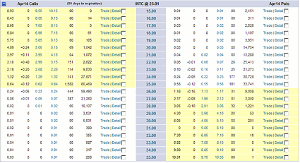Options trading is a powerful alternative to simply buying or selling shares stocks, and here, Markus Heitkoetter of Rockwell Trading, details what you need to know to get started.
Stock option trading is a popular way to trade the markets. Since there are more variables involved than simply buying a stock, stock option trading is often believed to be too complex or advanced for the average trader.
It's true that there are more things to consider when buying and selling options, but options trading can be kept simple. In this article, we'll cover stock option trading information you should know, and why stock option trading is a powerful alternative to simply buying stock.
Why trade options?
These are the main reasons traders are attracted to options trading:
- Opportunities with a small investment – You can open an account with as little as $2,500. Depending on the option and the trading strategy, you can buy an option for as little as $1 (although with most trading you'll probably buy an option for $25 or more.)
- Strategies for ANY market direction – Depending on your market expectations, you can trade options that will make money when the market is going up AND trade options that will make money when the market is going down. Using slightly more advanced strategies you can even make money if the market is going sideways.
- Limited risk – When you are an option buyer, your risk is limited to the amount that you pay for the option.
- Greater potential reward – Although greater reward is typically accompanied by greater risk, the potential rewards are bigger compared to traditional stock buying and selling because of leverage.
What are options?
An option is a derivative of an underlying stock, index or market. When trading stock options, an option contract allows a trader to buy or sell 100 shares of a particular stock. Like all contracts, the details of the contract are laid out prior to the option purchase. (Note: These details are simply standardized by the exchange so all buyers and sellers know the rights and/or obligations of the option that is being traded.).
All options will have the following components:
- Option Class – Options are grouped into two categories: calls and puts. A call buyer has the right to buy stock at a specified strike price. A put buyer has the right to sell stock at the specified price.
- Strike Price – This is the price that a call option buyer can buy a stock at. This is also the price that a put option buyer can sell at.
- Expiration – All options have an expiration date. US stock options expire on the third Friday of the expiration month that is purchased.
- Underlying Asset – This is the market that the option contract applies to. The asset can be stocks, currencies, or an index. To keep it simple we'll focus on stocks.
Selecting the RIGHT Option
Now that you know the basics of an option, you need to know how to select an option to trade.
Choosing the right option requires the following 5 steps:
Step 1 – Choose a market
Step 2 – Identify the direction of the market
Step 3 – Decide on how much the market could move
Step 4 – Determine how long it will take for the move to occur
Step 5 – Select your options trading strategy
Let's look at an example using the steps above.
NEXT PAGE: Options vs. Stock Trading
|pagebreak|Say that we've scanned the Dow 30 for stocks on the move and we see that Intel (INTC) is ready to move higher.
Step 1 – We want to trade INTC
Step 2 – We believe that INTC is ready to move higher using technical analysis
Step 3 – With INTC stock currently trading at $25.01 a share, we believe the stock will trade up to $26.04 at a minimum
Step 4 – We believe that INTC will make its move in the next 10 days
Step 5 – If we believe that INTC will move higher in the next 10 days and we want to keep our risk limited, we will buy a call option.
Looking at an option chain below, we see that the price of the $25 strike April 2014 call is .64 cents. Since a basic option contract represents 100 shares of stock, the options quote is per share and we will pay $64 (.64 x 100) to buy the call.
As a call option buyer we have the right to buy shares of INTC for $25 a share any time before the option's expiration. If the stock moves up to $26.04 and we have the right to buy the stock at $25, our call option is worth $1.04 at a minimum. Since the purchase price of the option was .64 per share, we've made a $40 profit on the trade ($1.04 - .64 = .40 x 100 shares = $40).
How to Make Money When the Market is Going Down
The same steps can be used for a stock that is expected to move lower.
Say that we've scanned the Dow 30 for stocks on the move and we see that Nike (NKE) is ready to move lower.
How does this compare to stock trading?
With stock trading we need to follow the first two steps (determine the market and market direction). If we bought INTC stock at $25.01 a share and sold at $26.04 a share, we'd have a 4% return on our investment...not too shabby.
However, with a call option purchased for $64 we could sell the option for $104 at a minimum, resulting in a 62% return on the same move!
In the NKE example, we could sell NKE stock as a short seller for $73.58. If we buy the stock back at $69.00 we have a +$4.58 profit on the trade and a 6% return on our money.
However, with a put option purchased for $224 we would be able to sell the put for $600 at a minimum when the stock is trading at $69. With a $376 profit ($600 - $224) we would have a 167% return on the same move!
The biggest differences between the two examples are leverage and time. A stock will not expire, but an option will. At expiration a call option will either have value (if the stock is trading above the strike price), OR expire worthless (if the stock is trading below the strike price).
A put option will have value at expiration (if the stock is trading below the strike price) OR expire worthless (if the stock is trading above the strike price). But we don't need to wait until expiration to close our positions. As an option buyer we can close the trade by simply selling the option any time before expiration.
Options trading is a powerful alternative to simply buying or selling shares stocks. The leverage involved makes options trading a very popular trading vehicle, but it's important to understand that leverage can work against you as well. Although there are advantages to selling options as well, buying options is a great trading approach for beginners because risk is always capped and reward is unlimited. Now you know the most import stock option trading information.
By Markus Heitkoetter, Founder and CEO, Rockwell Trading











